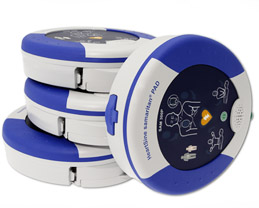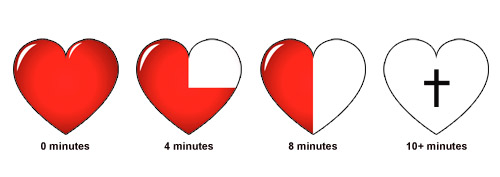Sudden Cardiac Arrest (SCA)
occurs when the regular pattern of the heartbeat changes to a chaotic rhythm called
ventricular fibrillation. In SCA victims, the heart cannot pump blood effectively
and the victim will collapse. The only treatment for sudden cardiac arrest is to
use an
Automated External Defibrillator (AED)
Sudden Cardiac Arrest
can affect anyone, at any time
whether young or old, fit or unfit, healthy or unhealthy. Sudden Cardiac Arrest
is the
world's biggest killer!
An AED or Automated External Defibrillator is a portable electronic device that
automatically diagnoses life threatening abnormal
heart rhythms and is able to treat them through defibrillation by applying electrical
therapy or shock.
 Standard features of an AED
Standard features of an AED
- AED's are designed for ANYONE to use 100% safely.
- Clear, simple voice prompts tell you exactly what to do.
- AED's have self adhesive electrodes for attaching to a patient.
- AED's typically contain replaceable battery packs lasting between 2 to 5 years.
- Shocks are delivered to the patient by pressing a button when advised.
- AED's also store ECG data for medical professionals and hospitals.
With approximately only
4 minutes until
brain damage can occur, it is essential that a defibrillator is readily
available. You can sustain life with CPR but an AED will be needed to return a heart
to its normal rhythm.

Who does SCA affect?
- Around 3 million people die from SCA every year; it is the world’s biggest killer
- You may be large, small, fat or thin
- You could be a smoker or a non smoker
- You might be healthy, unhealthy, young or old
- It can happen to anyone, anywhere and at any time!
- Only 5–10% of victims survive
- CPR alone will NOT restart a SCA victim’s heart
- 13% of workplace fatalities are from SCA
- Every minute that passes without defibrillation reduces survival rate by 7–10%
- Brain damage can occur after only 4 minutes
There is good news:
Survival rates have shown to increase
more than 50% when effective CPR is given and automatic external defibrillators
(AED’s) are
readily available.
34% of those who have installed an AED have used their defibrillator
at least once to save a life.
Sudden cardiac arrest could affect us all, but the people at highest risk are those
with a family history of cardiac problems, hypertension, diabetes and stroke.
Our
basic life support training
programme
teaches you exactly how to
use an AED.